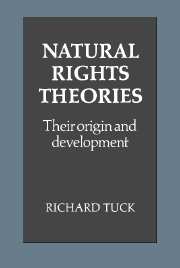Summary
Hugo Grotius was born into the humanist, Calvinist and Aristotelian world surveyed in the previous chapter. Its humanism stayed with him throughout his life, but he died under bitter attack for his desertion from its Calvinism and Aristotelianism. Yet it was this desertion which (as the eighteenth-century historians of the Enlightenment realised) transformed Protestant culture and made the political theories of the later seventeenth and eighteenth centuries possible. He is the most important figure in the history which we are tracing, and the origins of his treachery (as it seemed to contemporaries) need to be carefully eucidated.
Born in 1583, and a precocious student at Leiden University from 1594 to 1597, he was educated in the heyday of Protestant Aristotelianism and counted distinguished Aristotelian scholars such as Daniel Heinsius among his close friends. He was also exposed there to the older Protestant tradition of juristic humanism, an exposure continued in the law faculty of the University of Orleans where he studied from 1597 to 1599, and in the training for advocacy on which he embarked when he returned from France. His family and friends had long expected heroic achievements from him: their adulation and his own brilliant career combined to make him a sharp, confident, fast-talking intellectual of a recognisably modern kind, capable (for example) of immediately disrupting the restrained dinner tables of England on his visit there in 1613.
- Type
- Chapter
- Information
- Natural Rights TheoriesTheir Origin and Development, pp. 58 - 81Publisher: Cambridge University PressPrint publication year: 1979
- 5
- Cited by



